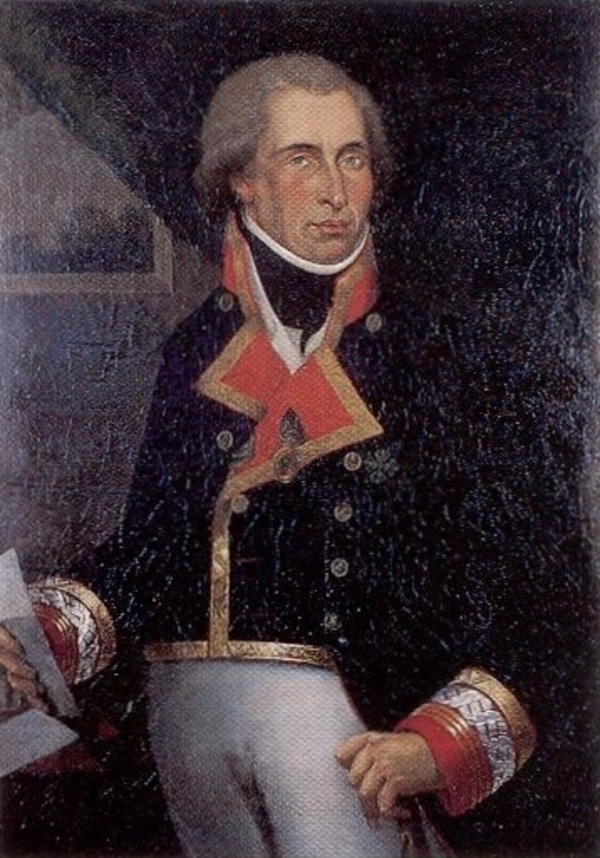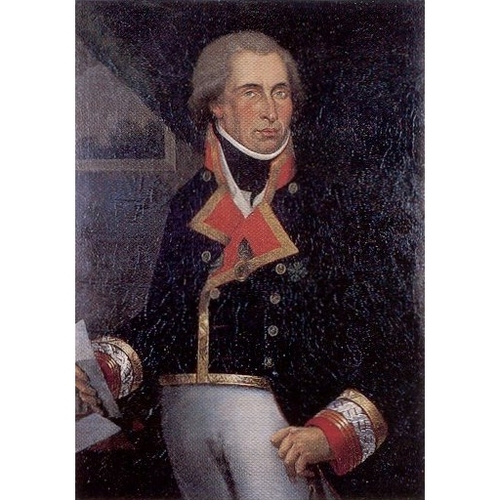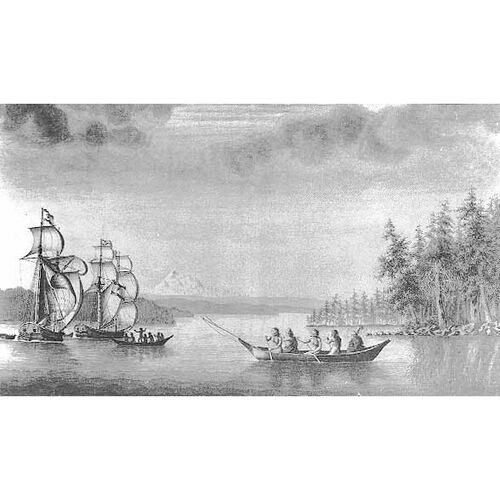
Source: Courtesy of Wikimedia Commons
ALCALÁ-GALIANO, DIONISIO, naval officer and explorer; b. 1762 in Cabra (Córdoba province), Spain, son of Antonio Alcalá-Galiano Pareja y Valero de la Serna and Antonio Alcalá-Galiano; d. 21 Oct. 1805 in the battle of Trafalgar, off the coast of Spain.
Dionisio Alcalá-Galiano entered naval school in 1775 and began active service in 1779. An officer with scientific training, he served in various hydrographic surveys of the Spanish and South American coasts before joining the round-the-world expedition of Alejandro Malaspina at Cadiz in July 1789. He would likely have remained obscure had not the Spanish crown decided to divert Malaspina from his intended path across the Pacific, dispatching him instead to the northwest coast of America. Malaspina’s failure to discover the fabled northwest passage during his short visit in the summer of 1791, coupled with the belief of Viceroy Revilla Gigedo of New Spain that Juan de Fuca Strait might prove to be its entrance, led to a viceregal order detaching lieutenants Alcalá-Galiano and Cayetano Valdés y Flores Bazán from the expedition to lead a survey party back to the area. On Malaspina’s recommendation they were both promoted frigate captain, and were placed in command of the Sutil and the Mexicana, schooners whose shallow draught made them suitable for exploration of inland waters.
The two officers took over the ships in Acapulco (Mexico) on 28 December, and under the command of Alcalá-Galiano in the Sutil they sailed on 8 March 1792. Their instructions were to complete the exploration of Juan de Fuca Strait begun in 1790 under the direction of Francisco de Eliza* y Reventa. In the event of the waterway’s leading to Hudson or Baffin Bay, the schooners were to return directly to Europe, avoiding foreign ports where news of the discovery might become known. The voyage north was difficult, but both vessels arrived safely at Nootka Sound (B.C.) on 13 May. The Spanish post at Friendly Cove, now under Juan Francisco de la Bodega* y Quadra, was assuming an appearance of permanence, owing to the efforts of Eliza and Pedro de Alberni during the previous two years. Like other visitors of several nationalities, Alcalá-Galiano noted the good relations prevailing with the Nootka Indians and called upon chief Muquinna*.
Departing Nootka Sound on 5 June, the schooners arrived the next day at Núñez Gaona (Neah Bay, Wash.), a post newly established by Salvador Fidalgo. On 13 June, upon rounding present-day Point Roberts, they encountered the Chatham under William Robert Broughton, second in command of the expedition led by George Vancouver*, and on 21 June, near modern Vancouver, they met the English commander himself. Friendly relations ensued, as the spirit of scientific cooperation outweighed that of international competition: sharing information, the two sides worked together until 13 July when they resumed circumnavigation of Vancouver Island separately. Having sailed northward through Queen Charlotte Strait and demonstrated far Spain the island’s insularity, Alcalá-Galiano completed his circuit on 31 August in Nootka Sound, where he found Vancouver’s ships already at anchor.
Upon returning to Mexico Alcalá-Galiano began editing reports of the voyage. His was to become the best known of the Spanish expeditions to the northwest because, untypically for this era of Spanish secretiveness, his account was published, though it did not appear until 1802. Compared with many Spanish reports of the northwest coast, Alcalá-Galiano’s was positive about its economic potential, and indeed his descriptions of woods and fertile lands present images of primeval beauty. His personal correspondence indicates his belief that it would be in the national interest to continue scientific experiments and exploration, and to make Spanish sovereignty permanent. He was not optimistic about the potential of the sea-otter trade as a stable economic base for settlement; the number of animals was limited and the Chinese had prohibited further importation of furs. Nevertheless, he was convinced that Spain would have to be active in the northern trade to maintain control over the region. He proposed a government subsidized system in which the heavy copper sheets in demand among the Indians would be exchanged at cost for their furs; once their profits had been subverted British and American traders [see John Meares; Robert Gray] would lose all interest in the northwest coast. Despite Alcalá-Galiano’s hopeful recommendations, his 87 days of intensive investigation of the waterways around Vancouver Island, though well received by scientists, were dismissed by Spanish officials as having done little more than satisfy scientific curiosity. Since no passage to the Atlantic had been found, they saw no motive to establish settlements.
Alcalá-Galiano returned in 1794 to Spain where he continued his geographical surveys. In 1796, commanding the frigate Vencedor, he took part in the battle of Cape St Vincent, off the coast of Portugal, which Spain lost to the British navy. Later he commanded naval escort vessels convoying silver treasure fleets from Veracruz (Mexico) to Cadiz. On 21 Oct. 1805, commanding the Bahama, Alcalá-Galiano died in action against the British at the battle of Trafalgar. At his death he held the rank of brigadier of the naval forces.
Archivo General de la Nación (Mexico City), Sección de Historia, vol.71. Museo Naval (Madrid), ms nos.619, 826. Relación del viage hecho por las goletas Sutil y Mexicana en el año de 1792, para reconocher el estrecho de Fuca . . . (Madrid, 1802; repr. 1958). Viaje político-científico alrededor del mundo por las corbetas Descubierta y Atrevida al mando de los capitanes de navío D. Alejandro Malaspina y Don José de Bustamante y Guerra desde 1789 á 1794, ed. Pedro de Novo y Colson (Madrid, 1885). Cook, Flood tide of empire. H. R. Wagner, Spanish explorations in the Strait of Juan de Fuca (Santa Ana, Calif., 1933). [For another opinion on the authorship of the Relación del viage, see the biography of Manuel José Antonio Cardero. dcb]
Cite This Article
Christon I. Archer, “ALCALÁ-GALIANO, DIONISIO,” in Dictionary of Canadian Biography, vol. 5, University of Toronto/Université Laval, 2003–, accessed December 26, 2025, https://www.biographi.ca/en/bio/alcala_galiano_dionisio_5E.html.
The citation above shows the format for footnotes and endnotes according to the Chicago manual of style (16th edition). Information to be used in other citation formats:
| Permalink: | https://www.biographi.ca/en/bio/alcala_galiano_dionisio_5E.html |
| Author of Article: | Christon I. Archer |
| Title of Article: | ALCALÁ-GALIANO, DIONISIO |
| Publication Name: | Dictionary of Canadian Biography, vol. 5 |
| Publisher: | University of Toronto/Université Laval |
| Year of publication: | 1983 |
| Year of revision: | 1983 |
| Access Date: | December 26, 2025 |




